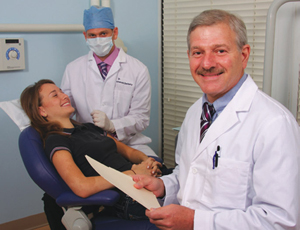Symptoms of TMJ Disorders in North Miami Beach, FL
Know When to Seek Treatment for Jaw Pain
If you’re experiencing any of the symptoms of temporomandibular joint (TMJ), don’t delay treatment. Contact our North Miami Beach, FL dentist today to schedule a TMJ evaluation and we’ll recommend the best treatment for you. Call Dr. Abbo and Dr. Gallego at (305) 945-0909 today for a temporomandibular disorders consultation.
When to Seek Help for Jaw Pain
The temporomandibular joint (TMJ) connects your jawbone to your skull. When temporomandibular joints become damaged or malfunctioning, it can lead to a range of symptoms collectively known as temporomandibular joint disorders (TMD). If you’re experiencing any of the following symptoms, consult our North Miami Beach dentist to determine if you have TMD and discuss appropriate treatment options.
Common TMJ Symptoms
- Jaw pain and tenderness of the upper and lower teeth: This can range from mild discomfort to severe pain, especially when chewing or opening your mouth wide. The pain may be localized to the jaw joint or radiate to other areas of the face, neck, and shoulders.
- Clicking or popping sounds: Hearing these sounds when opening or closing your mouth is a common sign of TMD. It can be caused by the disc that cushions the joint slipping out of place or by inflammation in the jaw joints.
- Limited jaw movement: Difficulty opening or closing your mouth can be a significant symptom of temporomandibular joint dysfunction. This can make it difficult to eat, speak, or even yawn. In severe cases, you may not be able to open your mouth more than a few millimeters.
- Jaw locking: Your jaw may become locked open or closed. This can be painful and make it difficult to function normally.
- Headaches: TMJ pain can often lead to headaches, especially in the temples or behind the eyes. These headaches may be constant or intermittent, and they can be accompanied by other symptoms such as dizziness or ringing in the ears.
- Toothaches: Even without dental problems, TMD can cause toothaches due to the interconnected nerves in the jaw and teeth. This can lead to confusion and frustration, as people may seek dental treatment only to find that the problem is related to their TMJ.
- Tinnitus: Ringing or buzzing in the ears can be a symptom of TMD. This is caused by the proximity of the ear structures to the jaw joint.
- Facial, neck, and shoulder pain: Facial pain in these areas can be related to TMD, especially when it’s accompanied by other symptoms. This is often due to muscle tension and inflammation caused by the strain on the TMJ.
- Teeth grinding (bruxism): Grinding or clenching your teeth can contribute to TMD symptoms. This can cause further damage to the TMJ and exacerbate existing pain and discomfort.
Types of TMD
Some types of TMJ disorder include:
- Myofascial pain disorder: This involves pain and discomfort in the muscles that control jaw movement. It is often caused by muscle tension and inflammation.
- Internal derangement: This occurs when the disc that cushions the TMJ moves out of place. This can cause clicking, popping, or locking of the jaw.
- Degenerative joint disease: Arthritis or other conditions can damage the TMJ. This can lead to pain, stiffness, and limited jaw movement.
- TMJ ankylosis: This is a condition where the joint becomes fused, limiting movement. It is a rare condition but can be very painful and debilitating.
Don’t Ignore the Symptoms of TMD
If you’re experiencing any of these symptoms, it’s important to seek professional help. Early diagnosis and treatment can help prevent further complications and improve your quality of life. A dentist can evaluate your symptoms, perform a physical exam, and recommend appropriate treatment options.
Frequently Asked Questions
How do I know if my jaw pain is due to TMD?
Several symptoms can indicate that your jaw pain is caused by temporomandibular joint disorder (TMD):
- Pain and discomfort: This can occur in your jaw joint, jaw muscles, or both.
- Clicking or popping sounds: These sounds may be heard when opening or closing your mouth.
- Difficulty chewing or biting: This can be caused by pain, stiffness, or limited jaw movement.
- Facial or neck pain: Aching or pain in these areas can be a sign of TMD.
- Swelling: Swelling on one or both sides of your face can be a symptom.
Can TMD affect my ability to eat or speak?
Yes, TMD can significantly impact your ability to eat or speak. Pain, stiffness, or limited jaw movement can make it difficult to chew or open your mouth wide enough to eat. Clicking or popping sounds can also be a problem. Additionally, if your jaw becomes locked or stuck, it can severely affect your ability to speak and eat.
What can be mistaken for TMD?
Certain conditions can mimic the symptoms of TMD, leading to misdiagnosis. These include:
- Headaches: Chronic cluster, migraine, or tension headaches can sometimes be confused with TMD due to similar pain patterns.
- Sinus issues: Persistent sinus pain or infections can cause discomfort around the temples, similar to TMD.
Don’t Let Jaw Pain Rule Your Life — Know When to Seek Treatment
If you’re experiencing any signs or symptoms of TMD, schedule an appointment with our North Miami Beach, FL dentist today. Early intervention can help prevent long-term complications and improve your quality of life. Our dentist may recommend treatments such as physical therapy, prescription medications, or surgical options depending on your case.
Call our North Miami Beach office at (305) 945-0909 to schedule a consultation with Dr. Abbo. You can also reach out through our website, where you’ll be put in contact with a helpful staff member.


